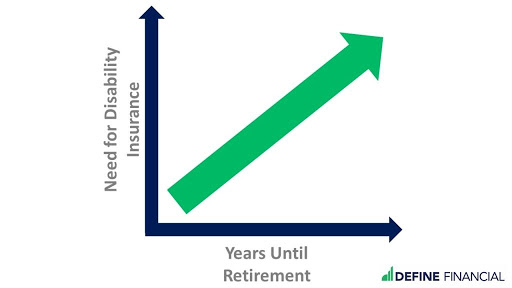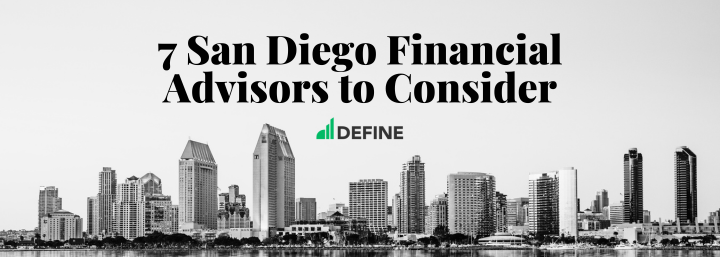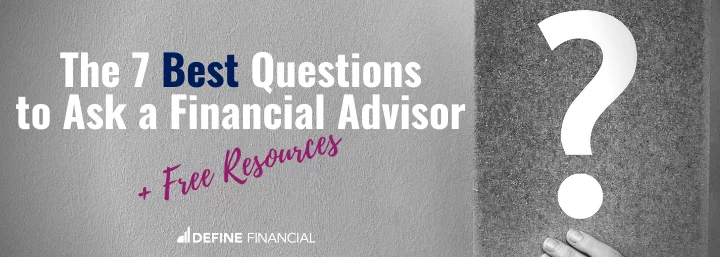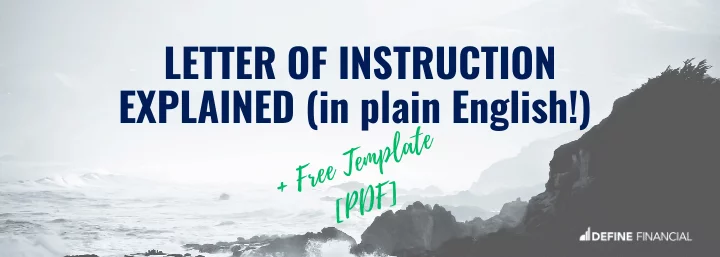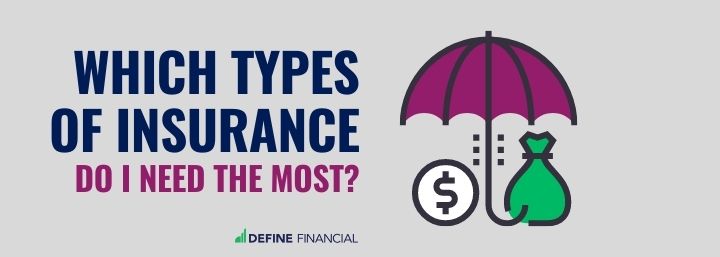
Today I’m sharing a step-by-step guide to attacking your insurance policies.
In fact, knowing what insurance to tackle first, second, third, etc, can help you maximize coverage and save money.
So if you’re ready to optimize your insurance policies and take action, today’s post is for you.
First, grab our free insurance checklists and workflows:
- Health and Life Insurance: Questions You Need to Ask in 2020 [PDF Checklist]
- Top 20 Issues to Consider When Reviewing Your Home and Auto Insurance [PDF Checklist]
- Will Your Healthcare Will Change as You Transition Into Retirement? [PDF Workflow]
There are many types of insurance policies to consider when it comes to protecting your family.
Some policies are required, like homeowner’s insurance if you have a mortgage. Other types of coverage are largely optional (e.g. whole life insurance).
Likewise, some insurance is a better deal than others, mostly because the reward of having coverage if you need it outweighs the cost.
But, which types of insurance do you need the most?
While the answer depends on an array of factors, I’ve put together a step-by-step guide helping you start with the most important insurance policies first.
#1: Health Insurance
Health insurance is a critical piece of every financial plan.
An unforeseen diagnosis or a major accident can leave you with a six or seven-figure medical bill.
That kind of financial hit could wipe your retirement savings and more.
If you have health insurance through your employer, that’s the best place to start. If not, you’ll need to shop the market.
While the future of American healthcare is largely up in the air, and the Patient Protection and Affordable Care Act (PPACA) could be repealed or replaced at any time, you can still compare plans on the website Healthcare.gov for now.
If your family’s income is below 400% of the Federal Poverty Limit (FPL), then you can qualify for subsidies that can make health insurance more affordable. You also get the chance to buy tiered coverage that suits your needs.
If you opt for a high-deductible health insurance plan (HDHP), then you can also open and contribute to a Health Savings Account (HSA).
With an HSA, you can set aside tax-advantaged money for healthcare expenses that can grow tax-free over time.
#2: Auto Insurance
If you want to own and operate a vehicle, then you have to have auto insurance as well. Your state mandates that you do, although all states have their own unique minimum coverage requirements.
Your auto policy includes a liability component, and that’s the most important part.
The optional part of your auto policy that insures the value of your vehicle is called comprehensive and collision insurance. For people who have an older car or sufficient cash savings, we suggest skipping optional comprehensive and collision coverage.
Skipping Comprehensive & Collision Insurance
Why do we suggest skipping comprehensive and collision insurance?
Because unlike liability insurance, the numbers at stake are relatively small unless you recently drove off the lot with a new Tesla.
That is, while it may not be an enjoyable experience to pay out-of-pocket for a new car in the event that you total your vehicle, a person with a healthy financial plan will, on average, come out ahead.
You can click here to learn more about this idea.
Maximize Liability Coverage
Most drivers should opt for auto insurance with the highest level of liability coverage available. Many should also buy additional liability coverage, which we’ll discuss later on.
Some states (like California) only require drivers to have as little as $30,000 in liability coverage. This is not even close to enough.
If you’re a healthy six-figure earner (or have a sizeable net worth) and you are in a wreck, you can believe the other person in the accident will come after you for the difference once the small amount of liability coverage you have is exhausted.
#3: Homeowners Insurance
Homeowners insurance is another type of coverage you are probably required to have. After all, you likely have a mortgage on your home. And your mortgage company will require this coverage to eliminate the risk of losing the asset that is securing their loan (your home).
Like auto insurance, homeowners insurance comes with a liability component that can help cover bills in instances where someone is hurt on your property.
Your homeowner’s policy will also come with dwelling coverage that can protect against fire, vandalism, some natural disasters, tornado damage, and more.
When purchasing homeowners insurance, you should make sure that the dwelling coverage amount is enough to completely rebuild your home from the ground up.
And, if you are eager to save money on premiums, consider bundling your homeowners and auto insurance policies together with additional liability coverage.
You can also tweak your deductible to save money on your annual premiums. Remember, the higher your deductible, the less you’ll pay for coverage each year.
#4: Life Insurance
Everyone should go through the exercise of exploring the need for life insurance. Having a small, basic policy is a smart move even when you’re young and don’t have a home or kids. But the importance of life insurance only grows from there.
If you have a house, debt, spouse, or any dependents, then you’ll want to make sure you have coverage to replace your shortfall if you’re gone.
Some experts recommend buying at least 10x your income in term life insurance coverage. But, you may want to buy considerably more than that. After all, replacing your income for just ten years won’t be enough if you die decades before your time.
This is especially true if you have debts like a mortgage to take care of. You may also want extra coverage to help pay for medical bills, kids’ activities, college tuition, and everything else you can think of.
We recommend buying term life insurance coverage that lasts during your working years. You can also purchase “laddered” policies. These provide more coverage when you’re younger and decreases as kids leave the home and you approach retirement age.
Either way, term coverage can be extremely inexpensive when you’re young. With Bestow, for example, a 40-year-old woman in excellent health could buy a 20-year term policy worth $750,000 for just $49 per month. Meanwhile, a 30-year-old man in excellent health could buy a 20-year policy worth $500,000 for less than $27 per month.
#5: Umbrella Insurance
While your homeowners and auto insurance policies come with some level of liability coverage, an umbrella policy can raise your liability protection into the millions of dollars. And if you’re worth that amount, you should be insured for that amount. Otherwise, you’re putting your assets at risk.
Fortunately, umbrella insurance is relatively inexpensive. A million dollars of protection can usually be purchased for $400 or less assuming you’re not overly risky.
But, don’t just stop at a million dollars in coverage. You want to be insured for the value of your net worth or your future net worth, whichever is greater.
For example, if you’re earning $200,000 a year and you’re 10 years away from retirement, you’re looking at a $2,000,000 umbrella policy. From there, add in your existing net worth. If you have $1,000,000 in assets, an umbrella policy with limits of $3,000,000 in coverage may be right for you.
#6: Disability Insurance
The more working years you have ahead of you, the more important disability insurance becomes. Meanwhile, if you’re just starting out in the workforce, disability insurance is absolutely critical.
Without disability insurance, you could wind up spending decades unable to contribute to your household finances or financially take care of yourself.
With a disability insurance policy in place, on the other hand, you could spend your time managing an injury, chronic pain, or a future disability and receive anywhere from 60% to 80% of the amount you earned before.
#7: Long-Term Care Insurance
Long-term care insurance can kick in to pay for nursing home care or assisted living if you can no longer live on your own.
A long time ago, purchasing a long-term care policy made sense. The cost of a policy was reasonable and the benefits were superb.
Unfortunately for consumers, the pendulum has now swung the other way. Premiums for a long-term care policy can be steep, and the benefits offered in the policies can be quite limited.
In all the times I’ve shown clients what they could expect to pay for a long-term care policy, the clients made the decision to skip it. This seemed to be the right decision — especially since the limited benefits of the policy were in amounts that the clients could financially bear themselves.
Either way, long-term care insurance may be worth considering if you have a considerable net worth and you don’t want to lose your nest egg to nursing home care. That might sound absurd, but it happens all the time given that the average cost of nursing home care is between $6,844 and $7,698 per month.
As one of the top Seattle financial advisors, Matthew Jarvis, says, “Hopefully you will never need long-term care services, but luck favors the prepared.”
No Matter What, Build an Emergency Fund
These are the main types of insurance you’ll want to buy as you build long-term wealth. However, you’ll encounter other types of coverage as time goes on.
For example, you can buy pet insurance, insurance for appliances, and even policies to replace the electronics you buy, like a new computer or television.
Of course, you may also come across financial “advisors” who try to sell you costly and complicated insurance products like whole life insurance or indexed annuities that purport to protect against losses in your portfolio.
It’s really up to you to decide which types of policies to buy beyond the ones everyone should have. Keep in mind that a fully-funded emergency fund can help you prepare as well. Most people are better off insuring against the biggest losses they could potentially face. Then they self-insure for the rest by having enough saved up in an emergency fund.
